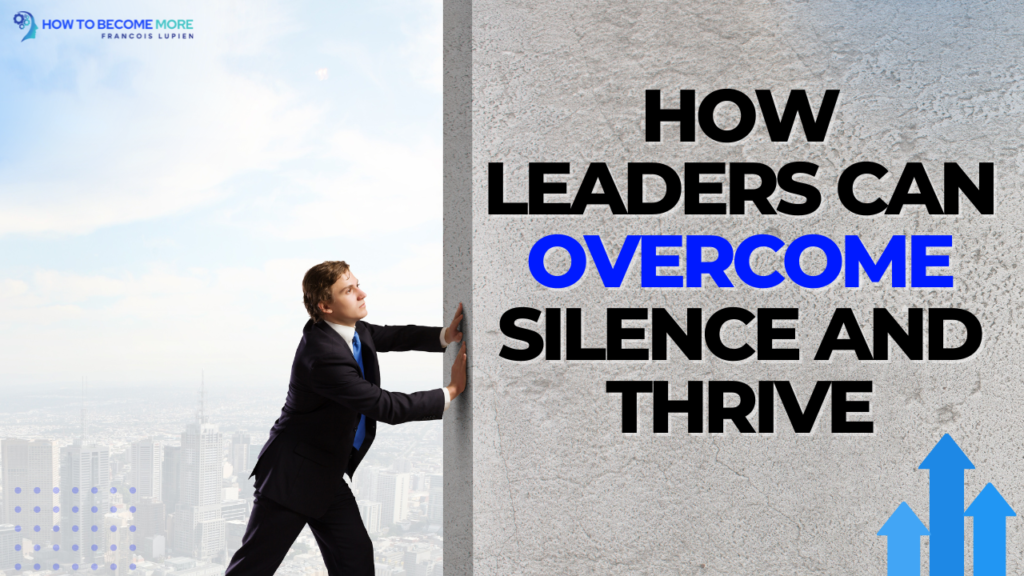As a CEO or business leader, you carry the weight of countless responsibilities. You’re expected to be the visionary, the decision-maker, and the source of strength for those around you. Yet, amidst all these roles, one of the greatest challenges many leaders face is something far less talked about—the fear of burdening others.
This fear often lurks in the background, unspoken but always present. It’s the voice in your head that whispers, “Don’t share your worries; people are counting on you.” It’s the inner doubt that convinces you your challenges, frustrations, and insecurities are too much for others to handle, leaving you to navigate them alone. But here’s the truth: this fear can not only isolate you but can also hold you back from reaching your true potential as a leader. Today, we’re going to dive into two essential questions: What causes someone to feel like a burden? And, most importantly, how can we avoid burdening others while still getting the support we need?
What Causes the Fear of Being a Burden?

Feeling like a burden often stems from deeply ingrained doubts*and insecurities. As a CEO, you may feel that you’re expected to have all the answers and that expressing uncertainty or frustration would make you appear weak or incapable. In a world where you’re constantly looked to for guidance, admitting vulnerability can feel like a risk too great to take.
On top of that, leadership often comes with a sense of isolation. You may find that you can’t confide in your employees—they depend on you for direction and support, not the other way around. At home, the dynamics may be different but equally challenging. You might not want to unload your business struggles on your spouse or family, fearing you’ll bring the stress of work into your personal life. The result? Silence. And in that silence, doubt festers.
But the reality is that this fear can lead to even more significant problems. By keeping everything inside, you may start to feel overwhelmed, unable to process your thoughts clearly. It can cloud your judgment, affect your decision-making, and prevent you from seeing the greatness within you that others often see.
The Leadership Paradox: Why Leaders Feel the Need to Keep Silent
Many CEOs and business owners live in what I call the “leadership paradox.” On one hand, you’re constantly reminded of the importance of being strong, confident, and decisive. On the other hand, you’re human, and like everyone else, you face moments of doubt, insecurity, and even fear.
But here’s the catch: when you’re constantly putting up a front, pretending that everything is under control, you’re missing out on a fundamental truth of leadership—authenticity builds trust. When you’re able to acknowledge your own challenges and seek support, you model a type of leadership that is far more powerful than stoicism: a leadership grounded in self-awareness and growth.
However, the fear of burdening others prevents many leaders from tapping into this authenticity. They feel they must carry their load alone, unaware that the act of sharing their struggles could actually make them stronger, not weaker.
How to Avoid Burdening Others Without Suffering in Silence
So, how do you break free from the fear of burdening others while still getting the support you need? It all starts with understanding that not everyone is meant to carry the weight of your challenges—and that’s okay. But this doesn’t mean you should bear them alone. It’s about finding the right person to share with, someone who understands the unique pressures of leadership and can offer confidential, judgment-free guidance.
This is where the power of confidential conversations comes in. Whether it’s with a mentor, coach, or trusted advisor, having a safe space to express your concerns, explore your doubts, and clarify your ideas can be transformational. These conversations allow you to shed the burden of perfectionism and access the wisdom and support that will help you see the solutions hidden beneath the surface of your worries.
When you find someone who understands your journey, something powerful happens. Your doubts and insecurities begin to lose their grip. You gain clarity. You start seeing the greatness within yourself that has been overshadowed by your self-imposed silence.
The Importance of a Confidential Confidant
Leaders often think that the best solutions will come from within. While this is partially true, external insight can be the catalyst that helps you uncover those solutions. Think of it this way: even the most successful athletes rely on coaches to help them reach their peak performance. It’s not because the coach is better than the athlete—it’s because the coach can see things from a perspective that the athlete can’t.
The same principle applies in leadership. Having a confidential confidant—someone you can trust to hold your struggles with care and wisdom—can help you clarify your thoughts and see your challenges from a new angle. They can offer you guidance that complements your own insights, making the process of opening up not just a release but an empowerment.
A good confidant doesn’t take your burdens from you; they help you see them for what they are—manageable challenges that you have the capacity to overcome.
You Are Not a Burden—You Are Empowered
Perhaps the most crucial point to remember is this: You are not a burden. Everyone faces moments of uncertainty, even the most successful leaders. These moments do not define you; rather, it’s how you navigate them that will shape your path forward.
By letting go of the fear of being a burden, you open yourself up to the kind of support that not only lightens your load but also empowers you to be an even stronger leader. This support allows you to shine brighter in your business, in your leadership, and in your life.
When you realize that it’s not about burdening others but about empowering yourself through meaningful conversations, the entire dynamic shifts. Suddenly, you’re not carrying the weight of the world alone—you’re sharing it with someone who helps you become even better at what you do.
The Cost of Inaction: Don’t Let Fear Hold You Back
Fear of burdening others is a subtle, insidious challenge. It often creeps into your life unnoticed, holding you back in ways you might not even realize. Maybe you’ve noticed a slight hesitation in your decision-making or a growing sense of overwhelm that you can’t quite shake off. Maybe you’ve avoided reaching out for help, thinking it would make you appear weak.
But here’s the truth: the longer you allow this fear to linger, the more it will affect your leadership, your business, and even your personal life. The cost of inaction is far greater than the discomfort of opening up.
By addressing your fears head-on and seeking out the right conversations, you’ll find that the very thing you were afraid of—being a burden—was never the real issue. The real issue is not allowing yourself the space to grow, evolve, and thrive.
Conclusion: The Power of Conversations and Self-Discovery
As a CEO or leader, your greatest strength lies in your ability to adapt, learn, and grow. But this growth doesn’t happen in isolation. It happens through connection, through conversations that challenge your doubts and help you see the greatness already within you.
If you’ve been holding back, afraid to share your struggles, know that you don’t have to carry that weight alone. By talking to someone who understands your journey—someone who can help you unlock your potential—you’ll discover that it’s not about burdening others. It’s about empowering yourself to become the leader you were always meant to be.
The answers you’re searching for? They’re already within you. Sometimes, you just need the right conversation to bring them out.





